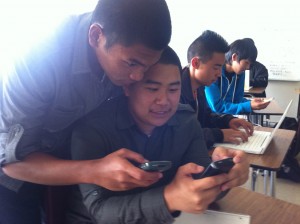One student tied it to the war that followed: "the gov prolly didn't stop 911 cuz they prolly had more benefits from the aftermath. Ie. Patriot act,war,etc."
Most of the kids immediately took to the idea for a number of different reasons.
“I think that using Twitter to do an assignment is maybe the coolest assignment in school," said Jason Wong. "I like how we are able to do this through the phone and people can see our thoughts."
Nikko Maraya piped in: "We should do it in every class.”
Beyond the novelty of tweeting, the students said they felt their voices were being heard and they created a connection to the topic. Their friends cared what they wrote and the conversation opened up to a larger community than just the class. They knew it was on the KQED site and enjoyed watching the Twitter feed update on the website.
“I learned about 9/11 that many of my peers were too young to understand about the situations and they were really clueless about it," said Japhet Sabucdalao. "I think it really helped my experience because it made be see different ways of things, like different perspectives of people during 9/11.”
For Sherry Wu, the gravity of the attacks on 9/11 sunk in during this assignment. “What I learned is that everybody has different ways of reacting about this situation and it's really sad that all these beloved ones lost their lives during 9/11," she said. "This helped me understand more about what I don't know and also, I want to learn more about it for references in the future.”
But there were a few who were concerned about how their tweets would be interpreted alongside their personal tweets, that, perhaps their audience would think it was disingenuous.
Eric Johnson who didn't want to mix his two very different sets of followers created a separate Twitter account for school. Just recently, he'd opened up his Facebook account to family members and teachers, and it was important for him to have a platform where he could truly be himself and not have to censor himself.
WHO CARES ABOUT TWITTER?
The class assignment focused on how technology has changed how we communicate, particularly with mobile devices and social media. They talked about the value of these tools in their everyday lives and how students could use these tools in school and as citizens of the digital world.
Ironically cell phones are currently not allowed at Burton. Facebook is blocked. But the teacher, Wendy Berkelman, recognizes the importance of using media to connect students to important local and global issues and gives them a voice in the conversation. The 9/11 exercise with Twitter was the first step towards that. She’s hoping that, if this experiment works, the cell phone policy may change at Burton where more teachers can use phones for learning.
Matthew Williams is the media expert at KQED Education. He spearheaded "Do Now," which encourages middle and high school students to participate in weekly topical discussions through social media tools.


